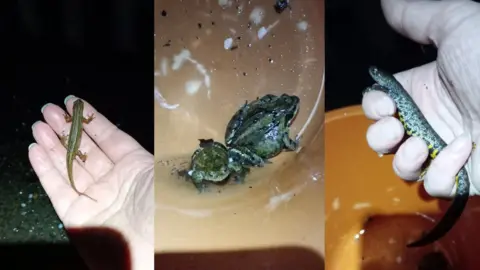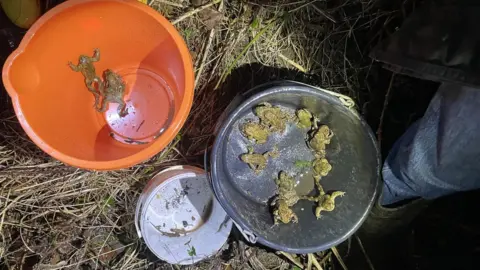Gloucestershire drivers urged to 'slow down' for toads
 Cat Marfell
Cat MarfellDrivers are being urged to "drive slowly" around ponds and wetlands as toads, newts and frogs head back to their breeding sites.
More than 270 volunteer toad patrollers have been assisting amphibians in Gloucestershire to cross roads and prevent them from being hit by cars.
They are operating at 38 different sites in the county.
Toads on Roads Network volunteer Cat Marfell said: "Just drive slow and take care and look out for patrollers."
Toads and other amphibians wait out the winter in woodland and shrubs in the colder months before returning to their breeding ponds in February.
"In the spring, toads come back out and go back to the same pond they spawned from," Ms Marfell said.
"If, in between that, there's a road put in the way, that's when it becomes an issue."
 Jason Doe
Jason DoeToads on Roads (ToR) was initiated by a Gloucestershire Wildlife Trust staff member a decade ago, although the two organisations are separate.
ToR is essentially a "citizen science project", Ms Marfell said.
At a toad patrol on Matson Lane this week, toad patrollers rescued newts and frogs in addition to toads.
Ms Marfell collects data regarding the number of toads spotted at each site.
Toad crossings tend to peak around Valentine's Day, but it depends on the weather.
'Difficult to see'
Ms Marfell said: "It's just coincidentally, it's very weather dependent.
"This year, it was pretty much on Valentine's Day that they came out as it just happened to be above six degrees and raining, which is the perfect conditions for a migration to start."
Ms Marfell admitted it is "quite difficult" to see toads crossing the road due to their preference for wet weather conditions but urged caution from drivers.
"If you notice people with hi-vis jackets, torches and a bucket in the middle of the night, chances are they're toad patrolling," she said.

Follow BBC West on Facebook, X and Instagram. Send your story ideas to: [email protected]
